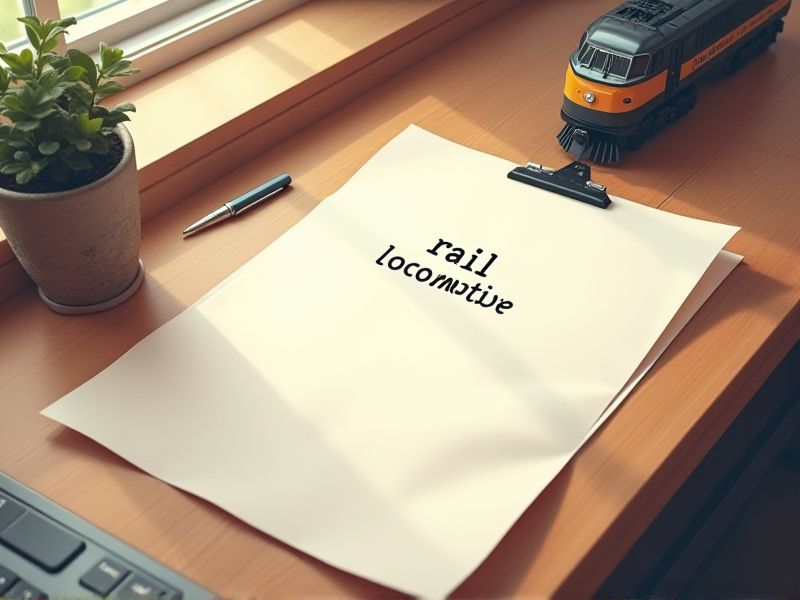
Operating rail locomotives involves complex machinery and significant responsibility, necessitating specialized knowledge and skills. Specific certifications ensure operators are well-versed in safety protocols, mechanical systems, and regulatory compliance essential for maintaining safe transit. These credentials validate an operator's competency to handle potential risks and foster confidence among employers and passengers. Some crucial certifications required for becoming a rail locomotive operator include those related to safety and operation standards.
FRA Locomotive Engineer Certification
Without FRA Locomotive Engineer Certification, operators have no verified assurance of meeting federal safety standards. Certification ensures locomotive engineers possess necessary skills to handle complex rail operations and prevent accidents. Rail companies gain credibility and meet legal compliance by employing certified engineers. Public safety increases due to operators adhering to stringent operating guidelines established by the FRA.
FRA Safety Management Certification
FRA Safety Management Certification enhances operational safety by ensuring rail locomotive operators adhere to stringent protocols. This certification empowers operators with the skills to prevent accidents and handle emergencies efficiently. It fosters a culture of accountability and continuous improvement among operators, reducing human error. Regulatory compliance through certification protects both public safety and industry standards.
Positive Train Control (PTC) Certification
Positive Train Control (PTC) Certification is crucial because it verifies a rail locomotive operator's capability to comply with federal safety mandates, thereby preventing train collisions and derailments. PTC Certification validates an operator's proficiency in using advanced technology for automatic braking and speed regulation. With certification, operators demonstrate their ability to mitigate human error, which is often a significant factor in railway accidents. Ensuring operators are PTC certified increases public trust in rail safety, crucial for maintaining a reliable transportation infrastructure.
OSHA Rail Industry Safety Certification
Lack of OSHA Rail Industry Safety Certification can lead to higher accident rates and increased liability for rail companies. Proper certification ensures operators are well-versed in safety protocols, reducing incidents and costly delays. Trained operators are essential for maintaining equipment and infrastructure, leading to longer service life and more efficient operations. Certification fosters a culture of safety, enhancing overall workforce well-being and productivity.
Hazardous Materials (HAZMAT) Training Certification
Hazardous Materials (HAZMAT) Training Certification is essential for rail locomotive operators because it equips them with the knowledge to handle and transport dangerous substances safely. Proper training reduces the risk of accidents and environmental contamination, ensuring compliance with federal safety regulations. Understanding emergency response protocols through certification helps operators manage potential HAZMAT incidents effectively. The certification enhances the safety of passengers, employees, and communities along rail routes by minimizing hazards associated with hazardous material transport.
Rail Industry Emergency Response Certification
Rail Industry Emergency Response Certification is crucial for locomotive operators to effectively manage incidents, reducing the risk of accidents. With proper certification, operators are better equipped to ensure passenger and freight safety, which aligns with industry safety standards. Enhanced preparedness through certification leads to quicker recovery from emergencies, minimizing service disruptions. Certification fosters standardized emergency protocols across the industry, promoting consistent safety practices.
Rail Switching and Terminal Operations Certification
The Rail Switching and Terminal Operations Certification ensures locomotive operators possess the necessary skills to safely and efficiently manage complex rail yard activities. Proper certification reduces the risk of accidents and inefficiencies by verifying that operators understand critical operational protocols. Certification also standardizes training, promoting consistency and proficiency across the rail industry. Rail companies benefit from certified operators through improved safety records and enhanced operational productivity.
Advanced Locomotive Operation Certification
The Advanced Locomotive Operation Certification ensures that rail locomotive operators have comprehensive knowledge of current safety protocols and technological systems. Certification enhances the operator's proficiency in managing trains effectively, thereby reducing the risk of accidents. It ensures consistency in skillsets within the workforce, which optimizes operational efficiency across the board. As rail technology advances, certification becomes crucial for adapting to complex control systems and maintaining service reliability.
Rail Signal and Communication Certification
Rail Signal and Communication Certification is crucial for ensuring that locomotive operators can correctly interpret and react to signal systems, which directly impacts train safety and efficiency. Proficiency in rail communication minimizes the risk of accidents by fostering clear and accurate exchanges between operators and control centers. Adherence to standardized communication protocols further ensures compatibility and reliability across various rail networks. Regulatory bodies often mandate certification to enforce uniform safety standards and procedures within the industry.
Railroad Track Inspection Certification
Railroad Track Inspection Certification ensures locomotives operate on tracks that meet safety standards. Without the certification, operators may not be equipped to recognize hazards that could lead to accidents. Trained operators are better prepared to identify potential maintenance issues that could disrupt service or cause derailments. Certified inspections help maintain regulatory compliance, promoting public trust and operational reliability.
Summary
When you, as a reader, receive certifications as a rail locomotive operator, you boost your credibility and enhance your skill set. Certification leads to increased job opportunities and may result in a higher salary potential due to recognized expertise. The rail industry values certified operators, often providing more responsibilities and leadership opportunities. Improved safety and efficiency in operations are expected, reflecting the training and standards achieved through certification.
